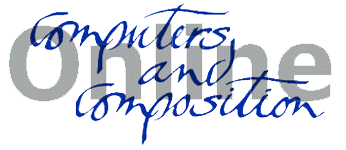Fall 2011 - Guest Editor's Welcome
Special issues of any journal can provide readers with unique perspectives on importance aspects in the discipline. I am thankful to have the opportunity to edit this special issue of Computers and Composition Online for various reasons, but I am primarily encouraged that ethics and digital media use is receiving important attention. This special issue provides important critiques, practical applications, and professional perspectives on some of the ethical dimensions of teaching writing with digital media. It is my sincerest hope that readers find these webtexts helpful to their own teaching. While reading this issue on “Ethics in a Digital Age: Ethics and Digital Media in the Writing Classroom,” my hope is that teachers, researchers, and digital rhetoricians will attend to the ways in which the ethical is part of everything we do and that it is our responsibility to consider the impact and importance of ethical literacy.
The Theory and Practice section features articles by Dànielle DeVoss (a regular contributor to CCO) and Julie Platt, Adam Pope, and Elizabeth Kleinfeld. In “Image Manipulation and Ethics in a Digital–Visual World,” DeVoss and Platt share a series of visual examples that pose particular visual, rhetorical, and ethical quandaries related to image manipulation. Helpfully, DeVoss and Platt examine the ways in which visual representation can be situated ethically and interrogated rhetorically as visual representation can divide and unify, identify and disassociate, and more. Adam Pope brings attention to the ethics of adopting course management systems in our subsequent piece. Pope argues that teachers of writing should see course management systems as “rhetorically constructed human designs.” Practically, Pope demonstrates how those in composition can create their own CMS solutions making use of rhetoric and conceptual models that complement instead of conflict with what goes on in the writing classroom. Pope’s summary point is that ultimately, choosing a CMS is an ethical choice, one we can take an active role in.
Finally, drawing our attention to writing centers and research practices, Elizabeth Kleinfeld, a contributing researcher on The Citation Project, argues that the Project’s findings confirm and quantify what those who teach research writing and/or work in Writing Centers already know: students’ research processes often begin and end with a simple Google search and the top search returns—regardless of those source appropriateness or scholarly legitimacy—receive the most attention from students. Furthermore, Kleinfeld seeks to complicate writing center work by addressing several ethical dilemmas connected to how the Citation Project findings resonate with Writing Center work.
Our Virtual Classroom section explores practical pedagogies of culture jamming, pragmatic ethics, and critical digital literacy. Eric York explores the use of culture jamming, a type of independent media activism, in the digital writing classroom. York asks us to consider how culture jamming can liberate and criticize popular representations for our students. Richards, the following composition, diverts our attention to Dewey’s contributions to educational psychology and what a pragmatic ethic can teach students through blogging. In our last Virtual Classroom piece, Rachael Shapiro makes a case for critical digital literacy education as an ethical obligation in the writing classroom. By describing an assignment called “Righteous Remix,” Shapiro asks students to work collaboratively to localize the issue for a Syracuse University audience, demonstrating their complicity in the problem at various levels, leading students to construct an argument for local action through the remixing of their chosen documentary.
The Professional Development section of this special issue offers practical advice from an experienced member of the discipline as well as from new faces in the field. Michael Pemberton encourages readers and authors of digital texts to recognize the potential for endless authorial revisions in digital texts, which raises significant ethical questions for editors, librarians, and publishers, many of whom have a strong investment in the field as scholars and researchers themselves. Through practical examples and suggestions, Pemberton reviews some of the ethical issues related to editorial and archival “revisionism” in digital publication environments, partly from his perspective as editor of the online peer-reviewed journal Across the Disciplines, partly from the perspective of other editors of online scholarly publications (derived from interviews and survey data), and partly from the perspective of computers and composition theorists who have reflected on digital publishing practices, the influence and/or eventual demise of print culture, archival integrity in Web 2.0 environments, and editorial and disciplinary responsibilities. In our last piece, Angeli and Kopplemen contend that the field of Computers and Writing at large must become part of the solution for clearing up IRB misunderstandings. Through narrative and example, the authors offer specific strategies for interacting with IRB unfamiliar with the research conduct in the field.


